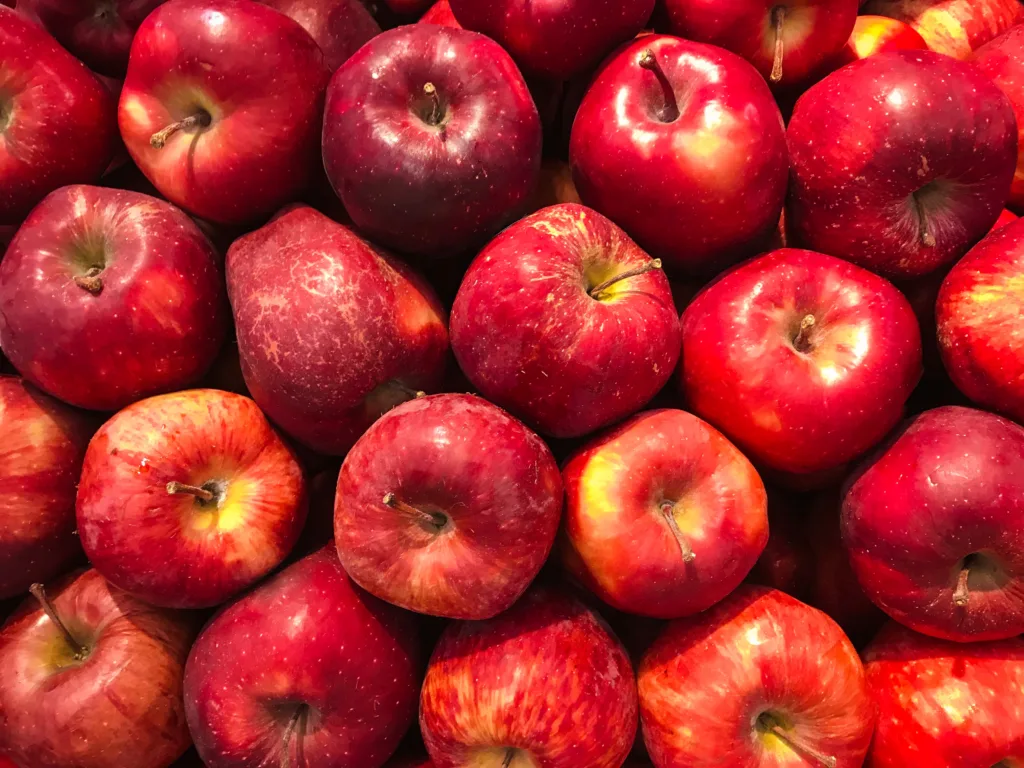Apples are one of the most popular fruits in the world. They are not only delicious but also pack a punch when it comes to nutrition. One of the most important aspects of apples is their calorie content. In this article, we will explore how many calories are in an apple and what makes them a great weight loss food.
One medium-sized apple contains approximately 95 calories. This calorie count may vary slightly depending on the size and variety of the apple. The majority of the calories in an apple come from carbohydrates, with a small amount coming from protein and fat.
Despite the calorie content, apples are still an excellent food choice for weight loss. This is because they are high in fiber, which helps to keep you feeling full for longer periods of time. Apples also cntain a type of fiber called pectin, which has been shown to reduce appetite and promote feelings of fullness.
In addition to their fiber content, apples also contain compounds called polyphenols. These compounds have been shown to have various health benefits, including reducing the risk of heart disease and certain types of cancer.
It is also important to note that apples are a low-sugar fruit. On its own, one medium apple contains only 19 grams of sugar, which is much less than a cup of unsweetened apple juice, which contains about 24 grams of sugar.
Apples are an excellent food choice for anyone looking to lose weight or maintain a healthy diet. Despite their calorie content, they are high in fiber and low in sugar, making them a filling and nutritious snack. So next time you’re looking for a healthy snack option, reach for an apple!
The Benefits of Eating Apples for Weight Loss
Apples are a great food to include in your diet if you are looking to lose weight. They are low in calories and high in fiber, which helps to fill you up and keep you feeling fuller for longer. This can help you to eat less overall and avoid snacking between meals.
One medium-sized apple contains around 95 calories and 4 grams of fiber. The fiber in apples is mostly made up of soluble fiber, which has been shown to help reduce appetite and promote feelings of fullness. This can be especialy helpful for people who struggle with portion control or overeating.
In addition to being low in calories and high in fiber, apples also contain a variety of vitamins and minerals that are important for overall health. They are a good source of vitamin C, which supports immune function, and potassium, which helps to regulate blood pressure.
When it comes to weight loss, it’s important to remember that no single food is a magic solution. Eating a healthy, balanced diet that includes a variety of fruits, vegetables, whole grains, and lean protein is the most effective way to achieve and maintain a healthy weight. However, including apples as part of a healthy diet can be a smart choice for those looking to lose weight.

Source: livestrong.com
Calorie Count of an Apple
Apples are one of the most widely consumed fruits around the world. They are knwn for their sweet and crunchy taste and are also packed with various nutrients that are beneficial for our health. If you are curious about how many calories are present in one apple, then you have come to the right place.
A medium-sized apple contains approximately 95 calories, which makes it a great snack option for people who are watching their weight. However, the calorie count may vary depending on the size and type of the apple.
Apart from calories, apples also contain various other nutrients that are essential for our body. One medium-sized apple contains 0.5 grams of protein, which is not a significant amount but is still important for maintaining muscle health. Apples are also free of fat, making them a great low-fat snack option.
In addition to protein and fat, apples are also rich in fiber, vitamins, and minerals. One medium-sized apple contains around 4 grams of fiber, which is about 14% of the recommended daily intake. Apples are also a good source of vitamin C, potassium, and various antioxidants that help promote overall health.
To summarize, one medium-sized apple contains approximately 95 calories, 0.5 grams of protein, and no fat. It is also packed with fiber, vitamins, and minerals that offer a range of health benefits. So, if you are looking for a healthy and low-calorie snack option, apples are definitely worth considering.
Is Eating Two Apples a Day Enough?
According to recent research, consuming two apples a day can be beneficial in reducing cholesterol levels and fighting heart disease. Apples are rich in fibre and polyphenols, which are known to help lower “bad cholesterol” levels in the body. However, it is important to note that two apples a day may not be enough to achieve significant results on their own. A healthy and balanced diet, along with regular exercise, is essential for overall health and reducing the risk of heart disease. Incorporating apples into a healthy diet can be a great way to boost your overall health and support your heart health, but it should not be relied on as the sole solution. It is always recommended to consult with a healthcare professional to determine the best curse of action for your individual needs.
The Sugar Content of Apples
Apples are a common fruit that many people enjoy due to their sweet taste and crunchy texture. However, some people may be concerned aout the amount of sugar in apples, especially if they have diabetes or are watching their sugar intake for other health reasons.
The good news is that apples, on their own, contain a moderate amount of sugar. One medium apple typically contains about 19 grams of sugar. This sugar is naturally occurring in the fruit and is accompanied by fiber, vitamins, and other beneficial nutrients.
Compared to other sources of sugar, such as candy or soda, apples are a much healthier option. They provide a satisfying sweetness without the added calories and harmful effects of processed sugars.
That being said, some apple products, such as apple juice or dried apples, may contain higher amounts of sugar. For example, a cup of unsweetened apple juice can contain around 24 grams of sugar. This is because the juice has been processed and the fiber has been removed, making it easier for the body to absorb the sugar.
If you are concerned about your sugar intake, it’s important to pay attention to the type and amount of apple products you consume. Opting for fresh apples or apple slices with the skin intact can help you enjoy the natural sweetness of the fruit without consuming excessive amounts of sugar.
While apples do contain sugar, the amount is moderate and accompanied by fiber and other beneficial nutrients. Choosing fresh apples and avoiding highly processed apple products can help you enjoy the sweet taste of apples without consuming excessive amounts of sugar.

Conclusion
Apples are a nutritious and delicious fruit that can be a beneficial addition to a healthy diet. They are low in calories and high in fiber, which can aid in weight loss and help individuals feel full longer. Apples also contain polyphenols, which have been found to lower “bad cholesterol” and potentially reduce the risk of heart disease. While apples do contain natural sugars, consuming them in moderation can provide a range of health benefits. Whether enjoyed as a snack or incorporated into recipes, apples are a versatile and nutritious choice.
